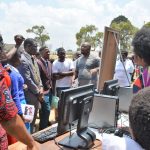Research project on girls’ inclusion in ICT education

ICT education is one of the main priorities at Centre for Youth and Development, and that girls become engaged in this is very important. Over the course of two months this summer I was conducting research in Mzuzu for my final project of my master degree. My name is Aurora Granaasen, a master student on the International Development programme at the University of Edinburgh. Throughout my studies I have had an interest in working with and for girls and women. For my final project I got the opportunity to do a work based placement with the Turing Trust, which is a Scottish organisation working in three African countries, including Malawi, providing computer equipment and software to schools. In Malawi, their partner organisation is CYD, and they distribute and maintain the computers in secondary schools in Northern Malawi. The project they wanted me to look into was on girls’ participation in computer classes where they had provided computers. This worked very well with my interests in gender and development, where I in this placement got to combine that with technology access and use. This turned out to be an incredibly interesting topic and project. Knowledge of technology is such a large part of the global environment, something that was confirmed by all of the participants in the project. To improve the access and use of computers for girls in Malawi was my main motivation to pursue this project.
The following will describe the research and the findings in more detail. The aim of the research and report was to explore the restrictions and limitations girls face in access to and use of computers in secondary schools in Northern Malawi, as well as discussing the implications this has for girls and their role in Malawian society, the ICT sector and computer education. Since the world as a whole has moved to a technological stage, many countries are lagging behind. Countries like Malawi are missing an adequate work force within the ICT sector, which prevents the country from being able to take part in the global ICT economy and system. In order to achieve this, the people need to become computer literate and have opportunities and motivation to enter into the ICT sector. In order for this to happen, physical access needs to be ensured, which is highly recognised in Malawian and African national ICT policies. What is more or less disregarded is the need for meaningful access, the focus on achieving sufficient computer literacy as an outcome of the physical access. In Malawi, the gender digital divide is divergent and contributing to significant differences between men and women in meaningful access and use of computers. Although the access is generally limited, the girls and women are at substantial disadvantage. This has severe consequences and implications for the development of the Malawian ICT sector, yet women’s access and use of ICTs can also lead to empowerment and social change. This is the background for the research and the foundation of which the primary research and results is built on.
The methodology used was a combination of different qualitative methods so that the results would be valid. The sample was chosen from five secondary schools that represented the five main types of schools. The main group of informants were female students trough focus groups, as they were the primary research focus. In addition, the study included semi-structured interviews with computer teachers and head teachers as experts on the gendered education system and computer education in Malawi. A questionnaire was also conducted with students, both male and female, that collected quantitative and qualitative data for analysis.
The research found four recurring themes to explain lack of girls in computer education; male dominance, time constraints, role models, motivation, and future prospects, and gender neutrality. Firstly, the Malawian society’s male dominance that was reflected in all aspects of the study, especially as a reproduction of gender roles in the education setting. It imitates the view that women are not supposed to work with computers. Secondly, the traditional gender roles means the girls have many responsibilities that take up most of their time. This leaves little time to use other computer access points apart from computer class, in the home or outside. It also affects their engagement in classes as they are often held outside of normal school hours. Thirdly, the lack of role models and future prospects leaves little motivation to enter into the ICT sector, or even to become computer literate. The lack of women in the sector only creates an “evil circle” that reproduces the view of women being unfit for computers. Lastly, gender neutrality and blindness in policy and practice is a hindrance to girls’ access and use, as their structural gendered disadvantage is not accounted for.
Through the analysis, the findings suggest that there are wider consequences of girls’ lack of engagement, for the girls’ own personal development, the development of a Malawian ICT sector, and effects on the progress towards gender equality. Finally, these restrictions and limitations the girls face in secondary education create wider consequences. It hinders their personal development, which has disadvantageous effects on empowerment, job opportunities and access to knowledge. It also affects the ICT sector, and leaves a substantial part of the work force without computer literacy or the ability to contribute in building human capital for ICT improvements. Lastly, the progress towards gender equality is prevented because it reproduces the gender disparities found in the Malawian society. Lack of computer literacy also affects the ability to access information, which also creates a larger gap in the information divide.
In conclusion, the male dominance in society is the main culprit and is connected to all other findings. By not acknowledging the structural gender inequality, there is little prospects of progress or positive outcomes of programs aimed at girls’ meaningful access to computer education. The focus needs to be on achieving meaningful access and use of computers and computer education for girls in secondary schools. As argued, this has such wider implications that emphasises the importance of investing in better ICT infrastructure in schools, sufficiently trained teachers and a gender sensitive policy and practice. This research has highlighted how the patriarchal society of Malawi is the main cause of low female engagement with computer education. This suggests a change of how society views women, a difficult and contested process. The importance is therefore in facilitating for the structural inequalities, including gender in policy and practice, and making sure that the schools accommodate for the girls’ needs. Based on the findings and arguments presented in this dissertation, there is a need to acknowledge the gender disparities rather than ignore them.
This was the research and outcomes found in my final master’s project on girls’ participation in computer education. It was a great project to work on, and I hope and believe the research will help in the efforts of both Centre for Youth and Development and the Turing Trust.

 Next Post
Next Post